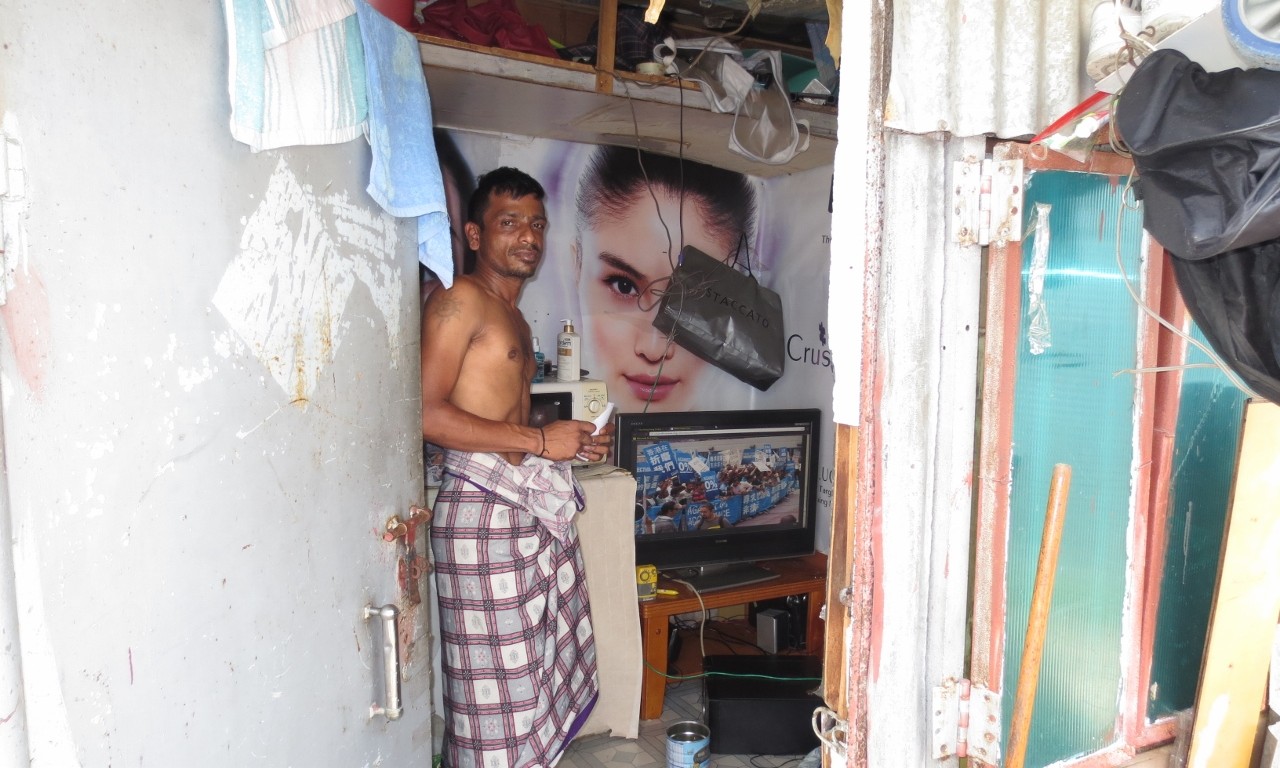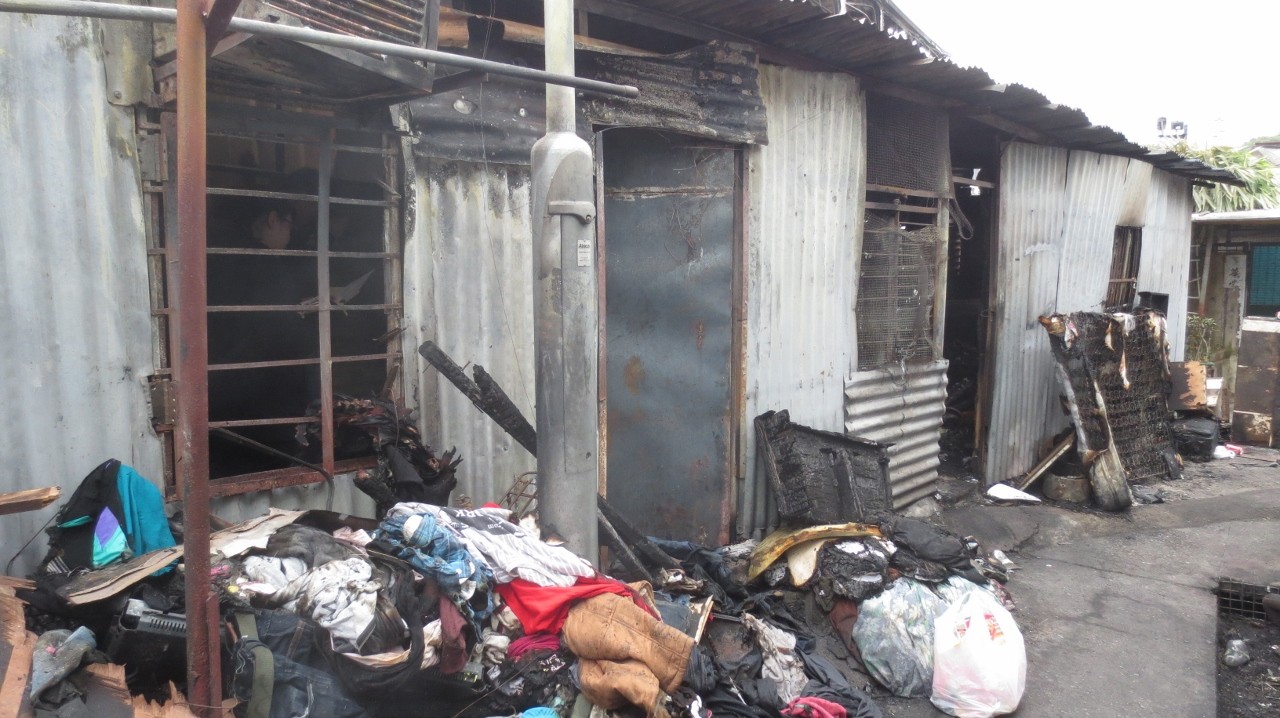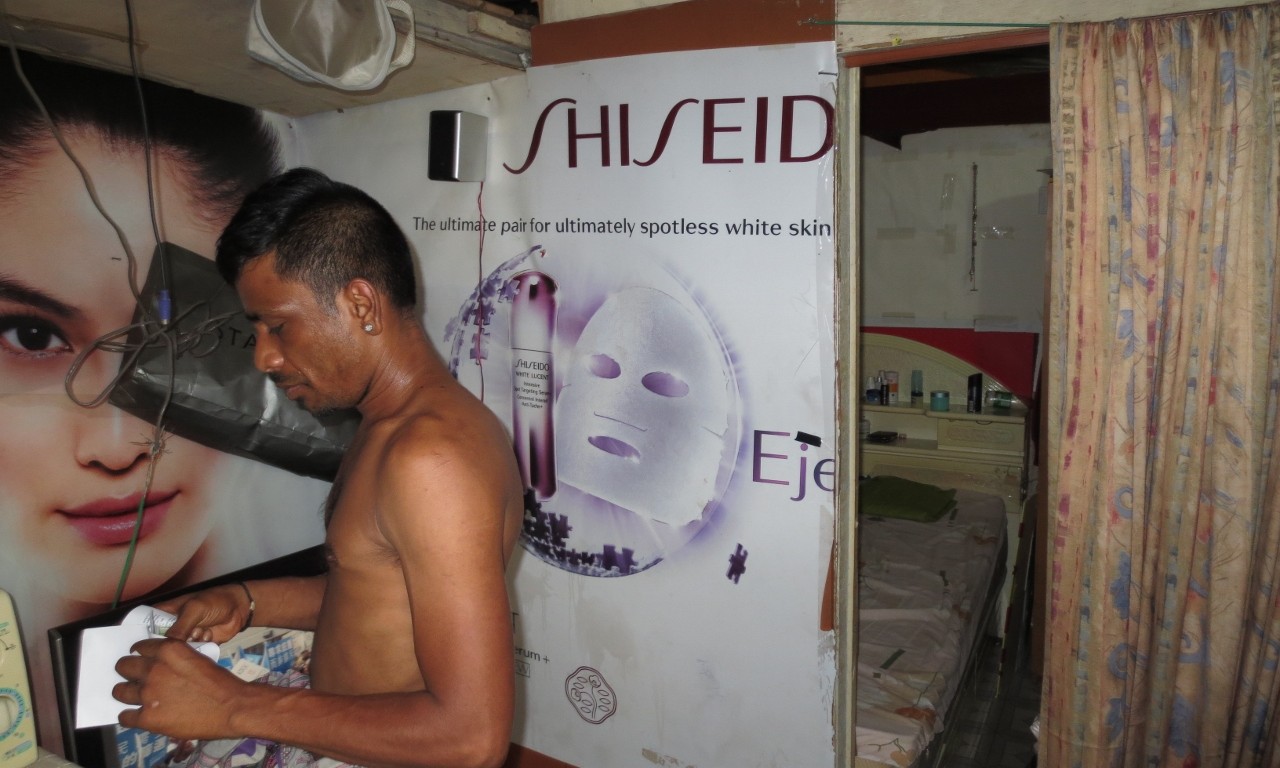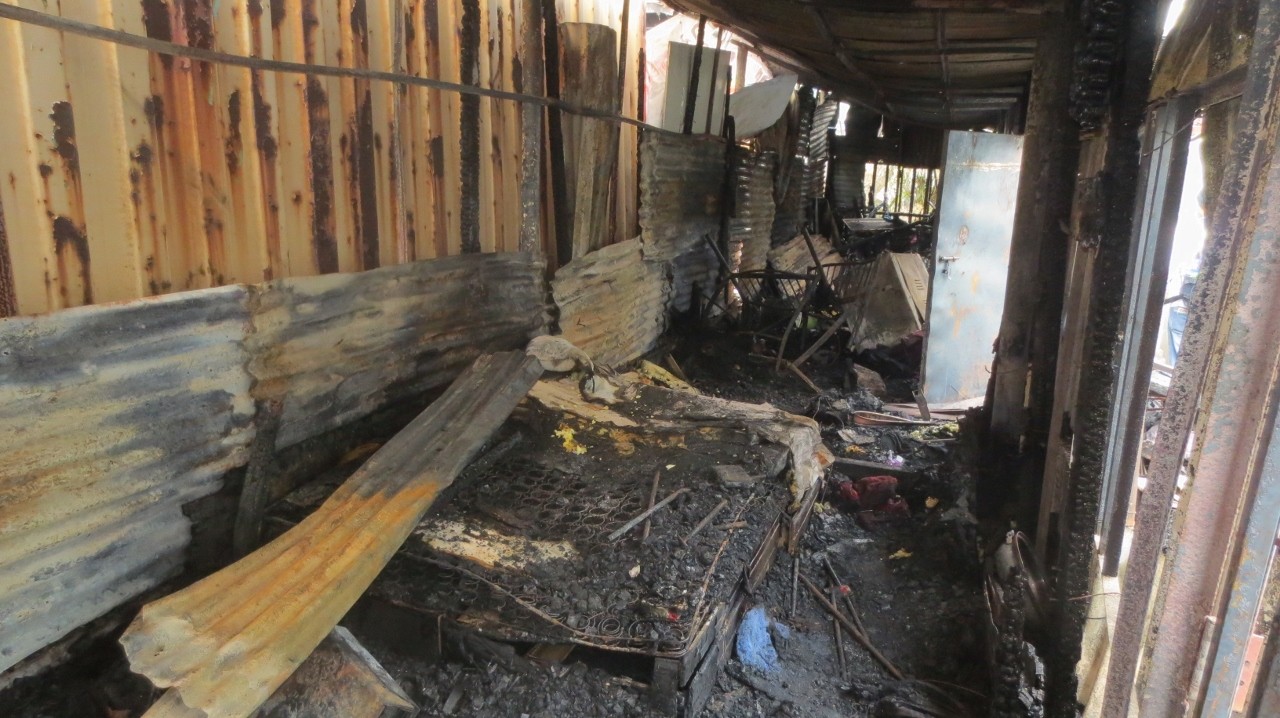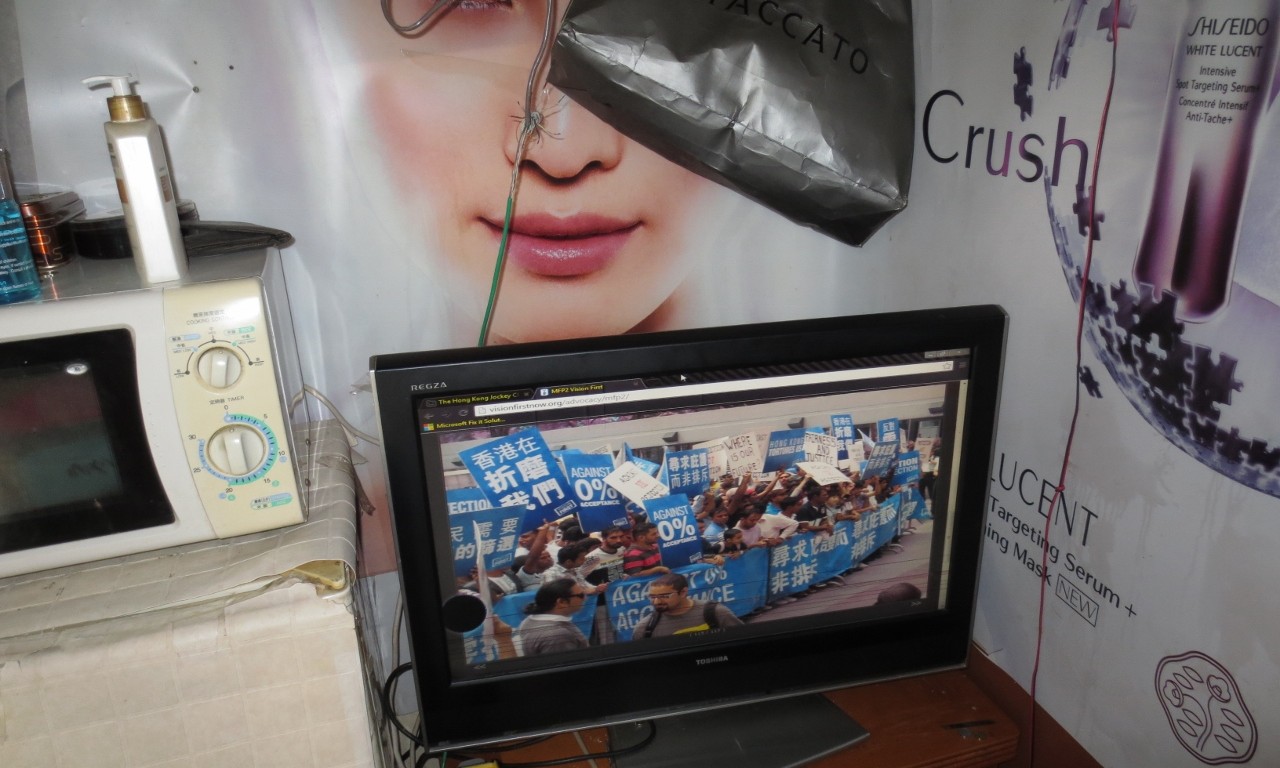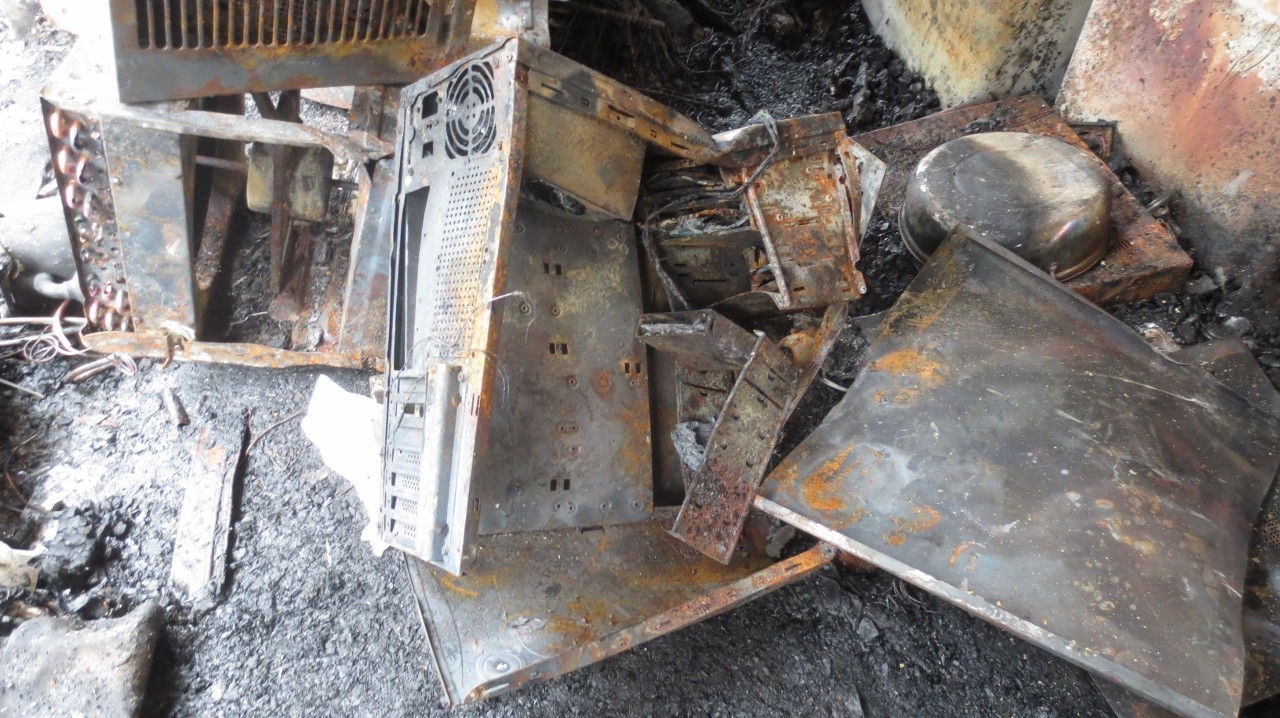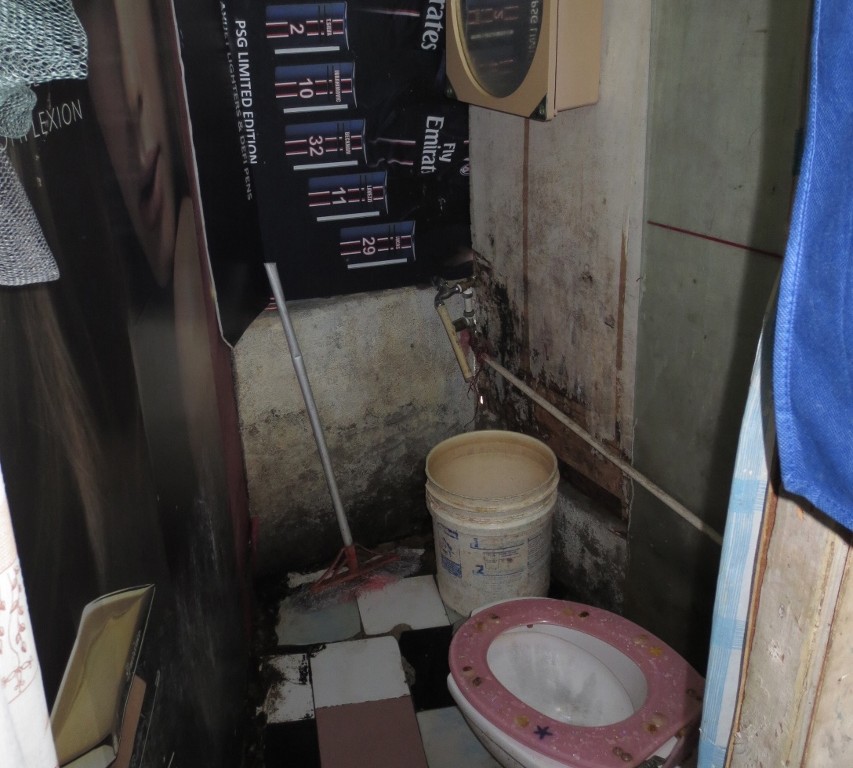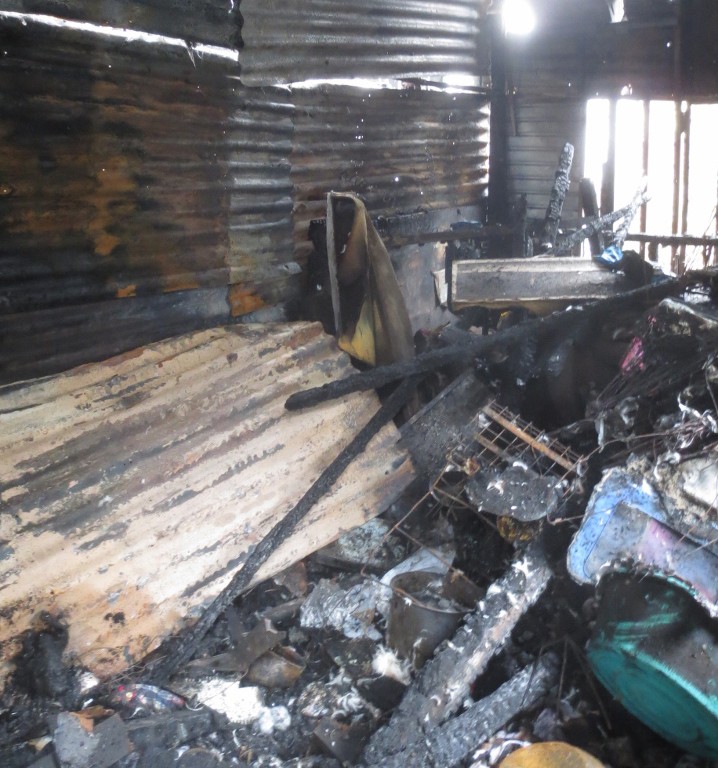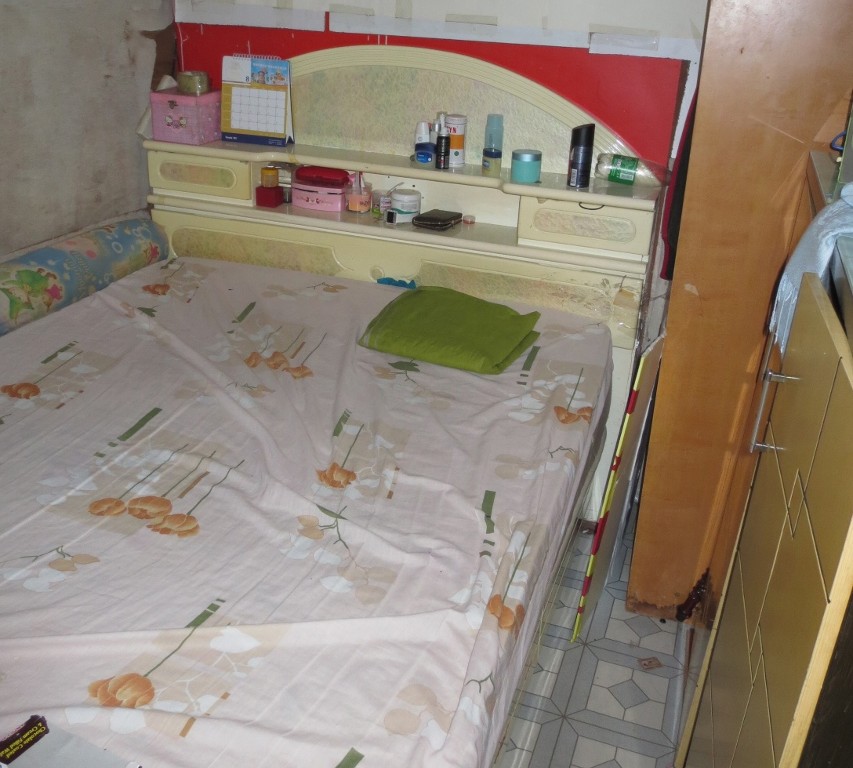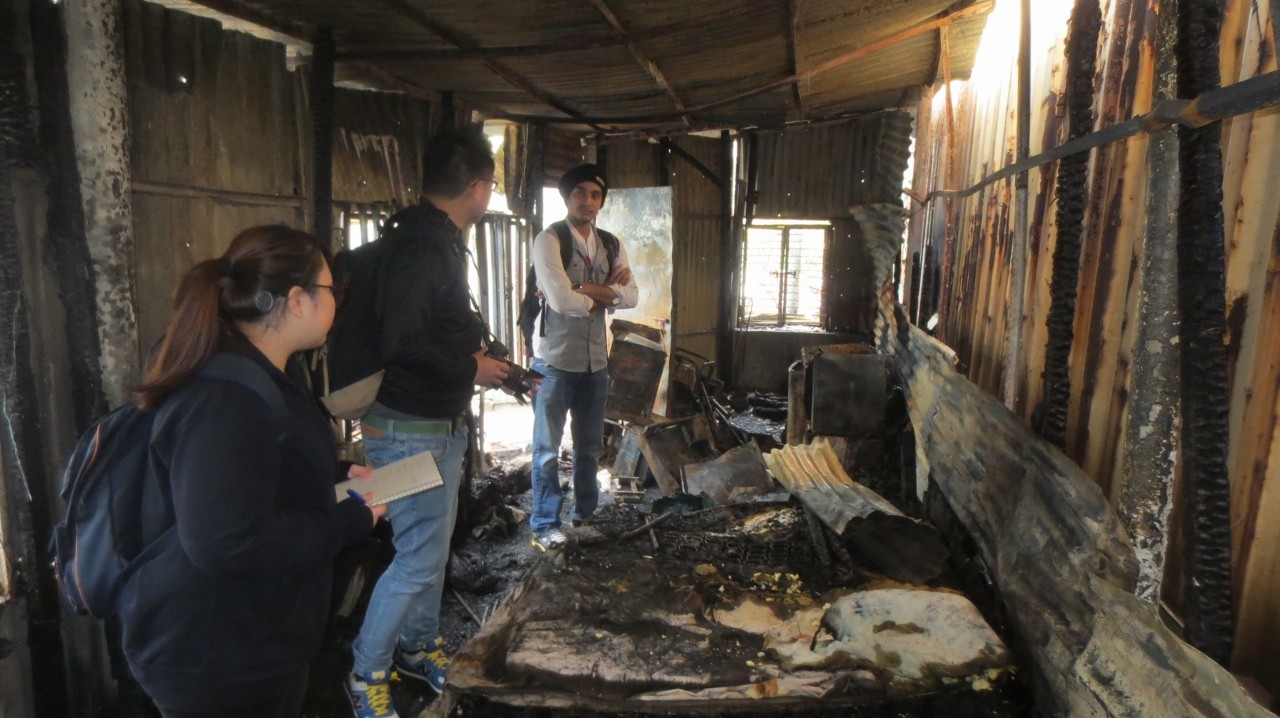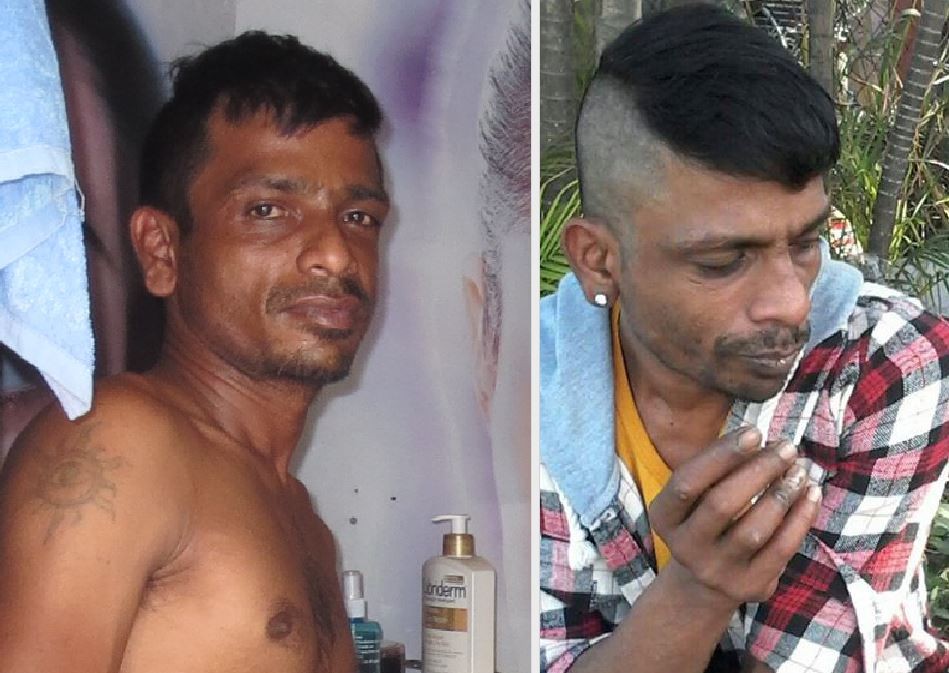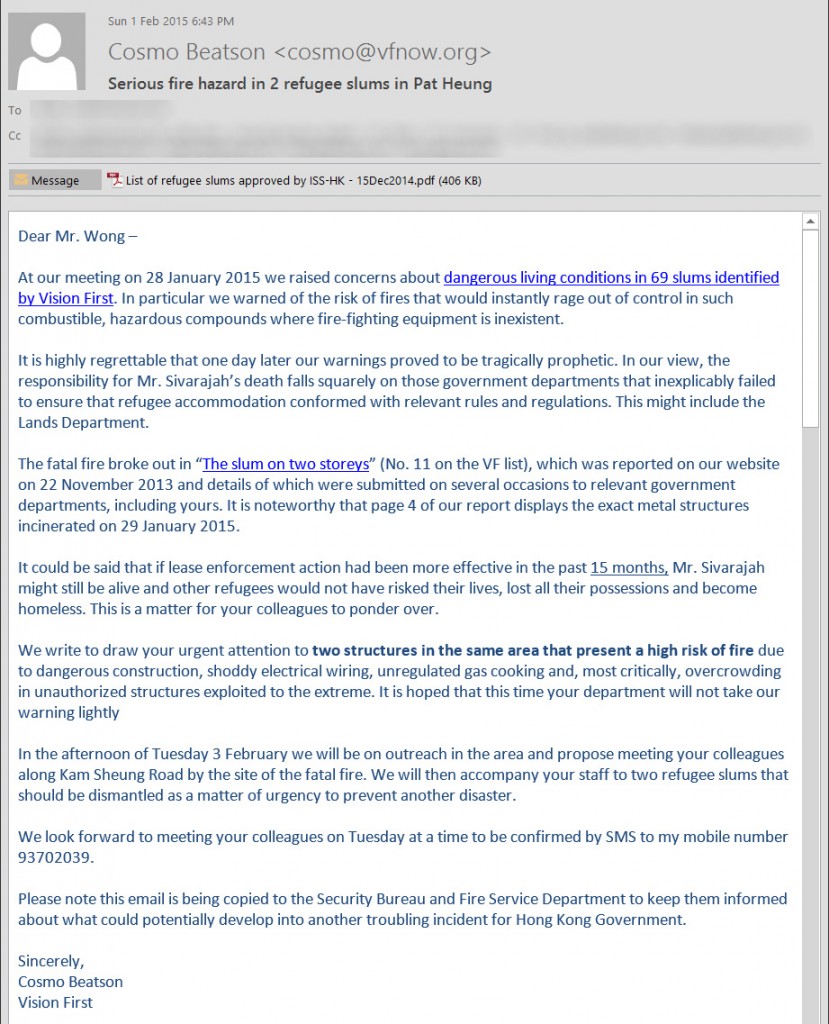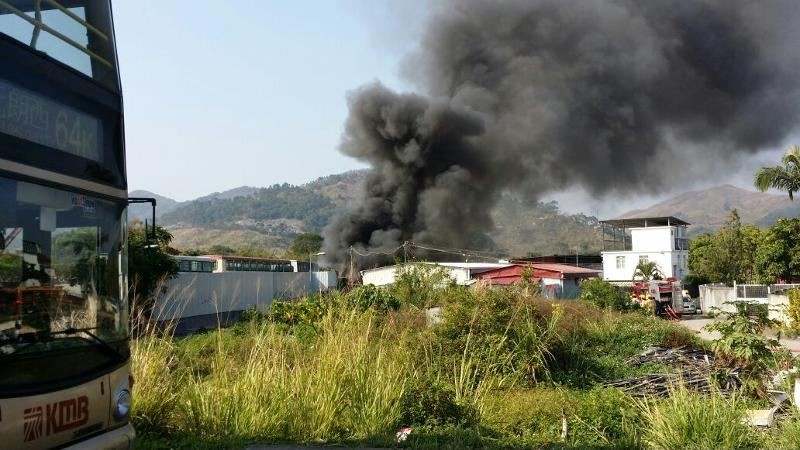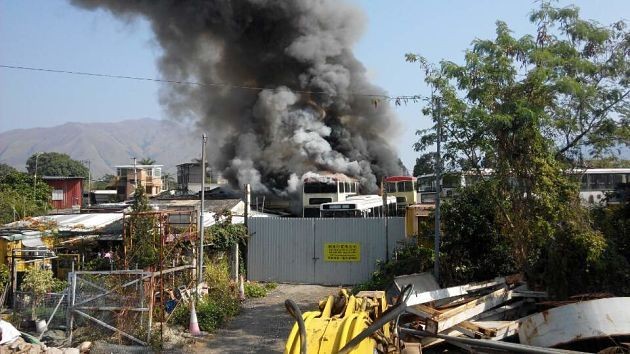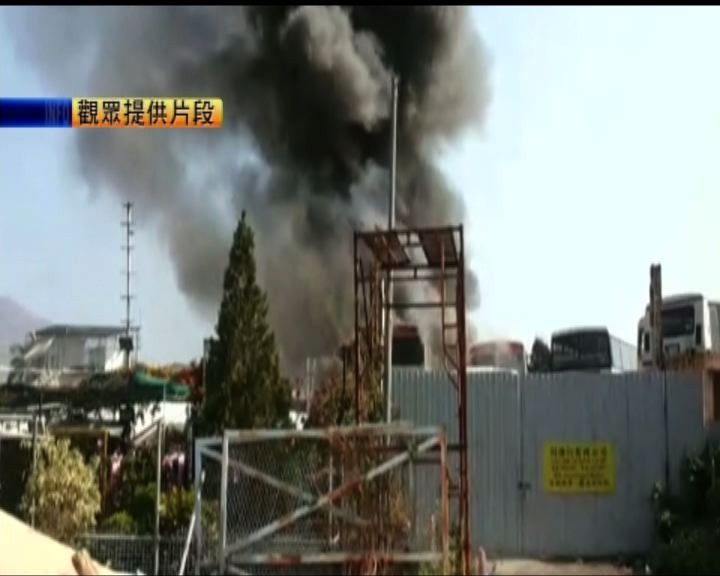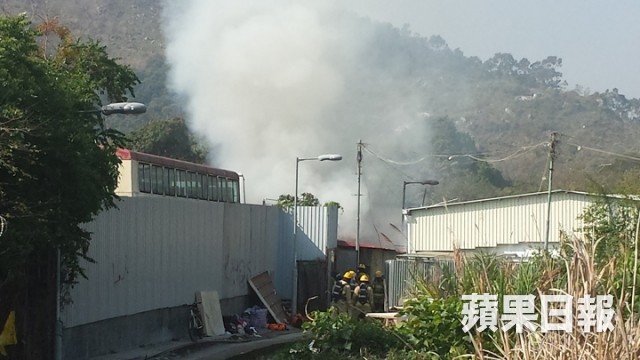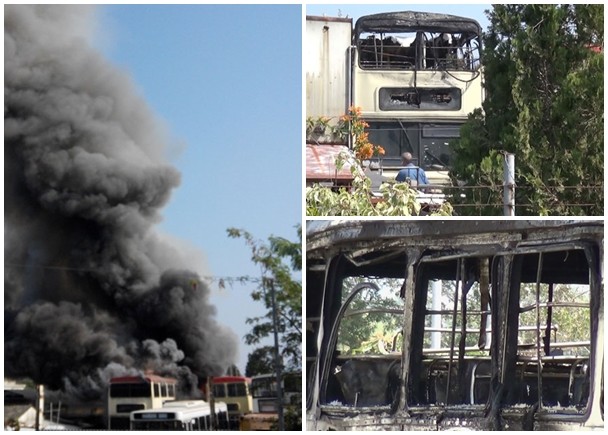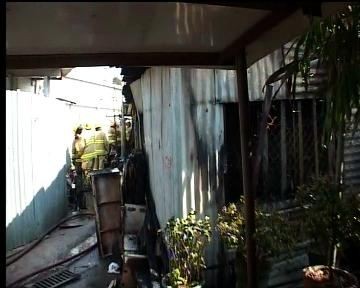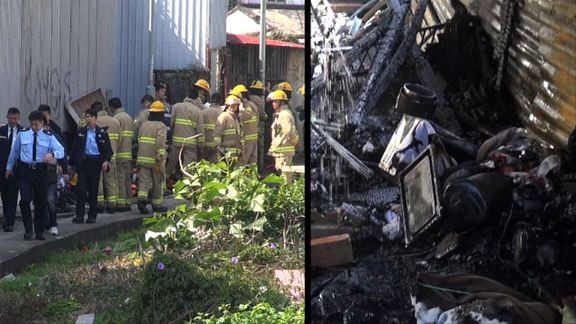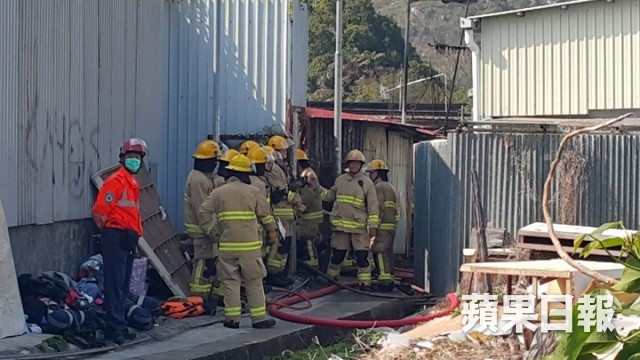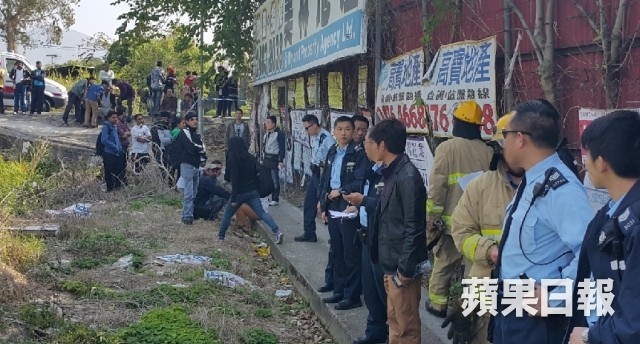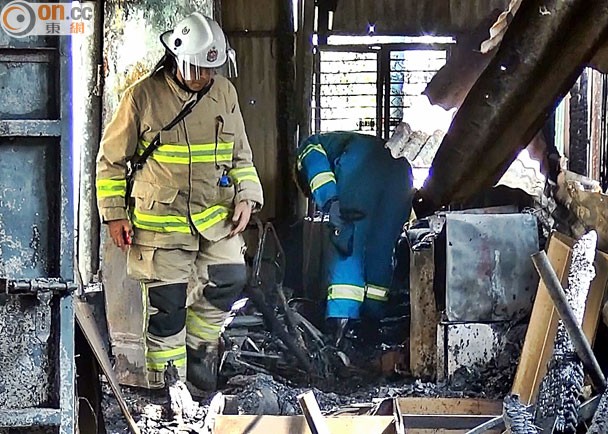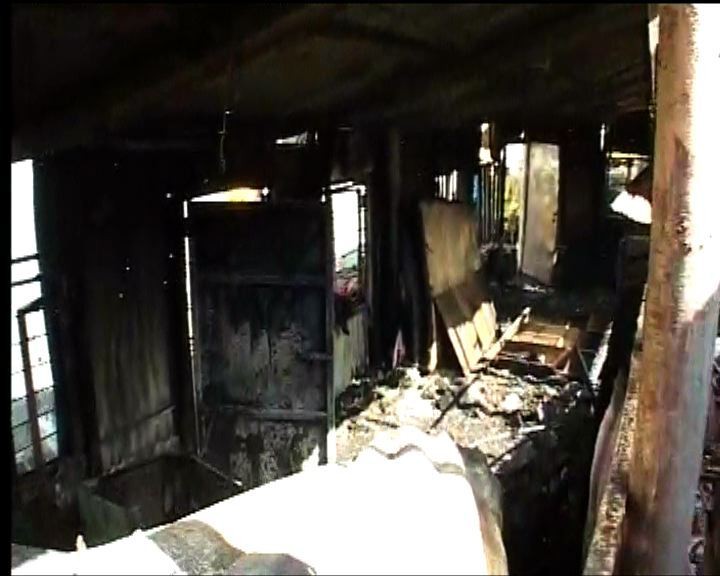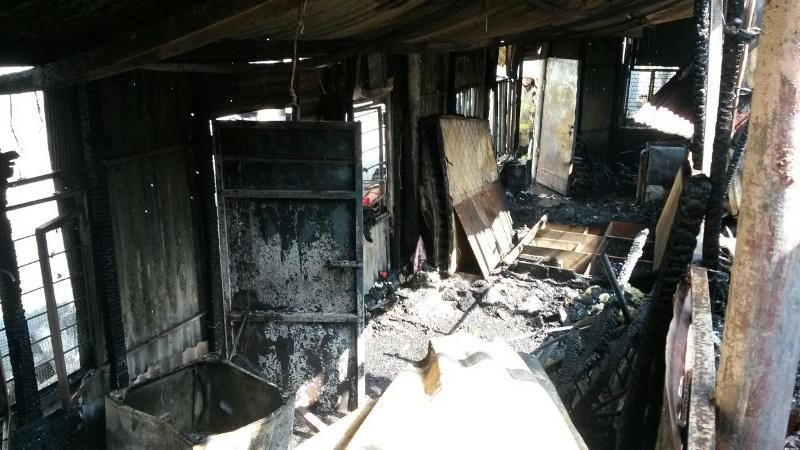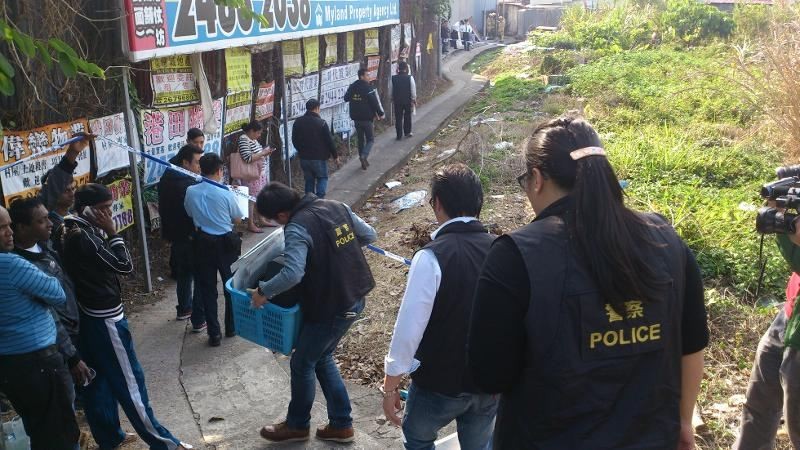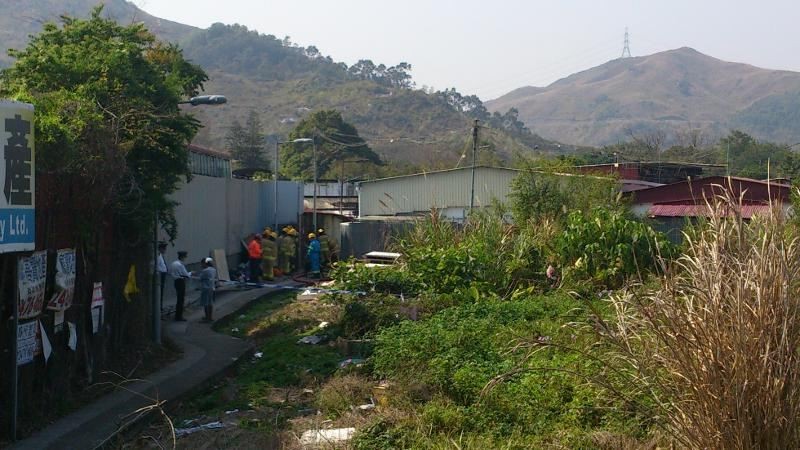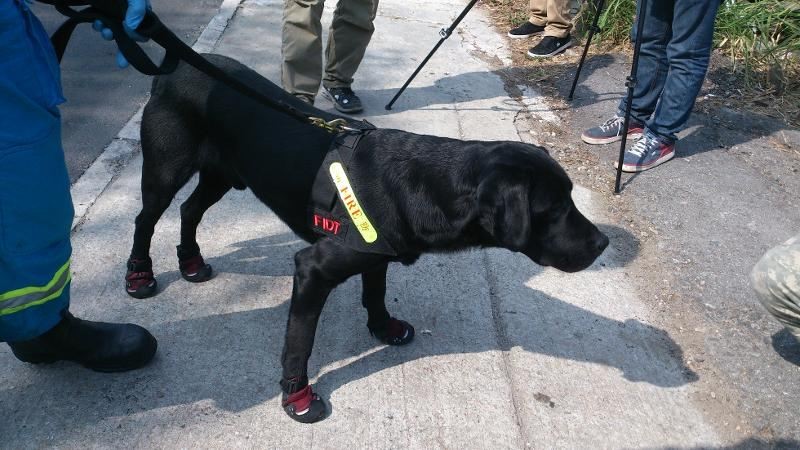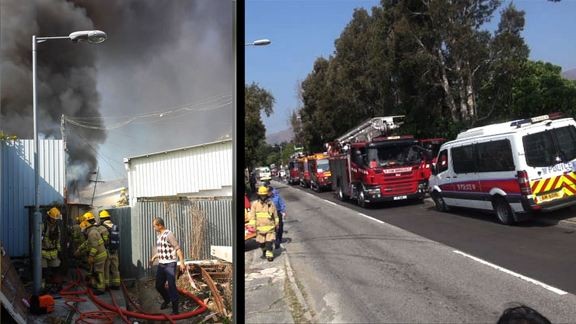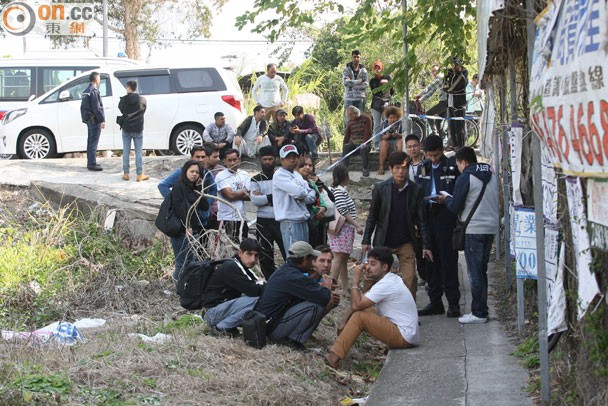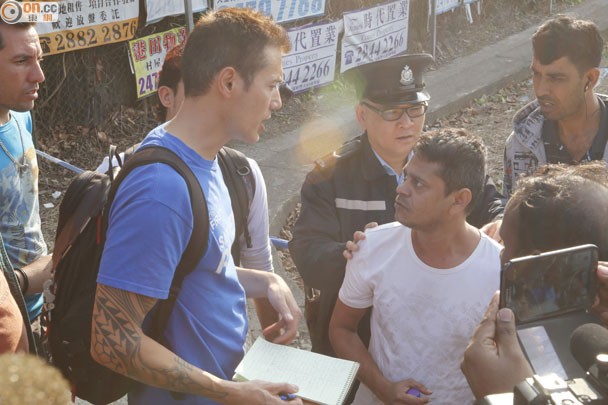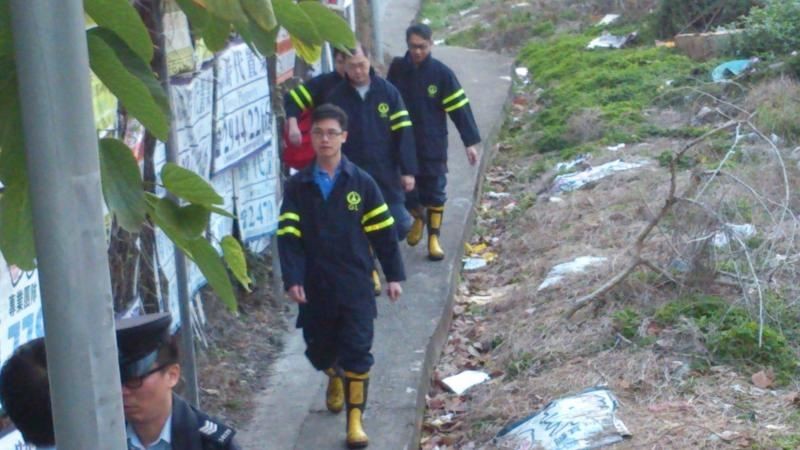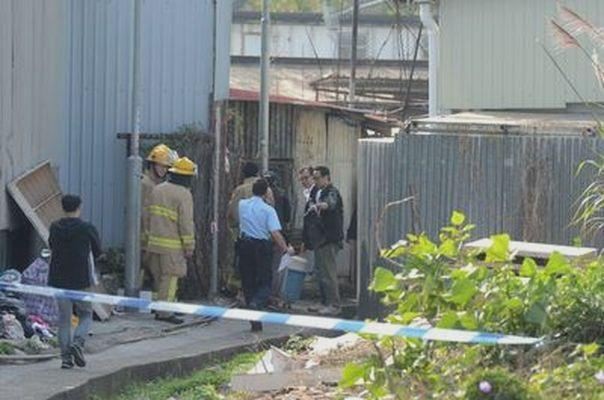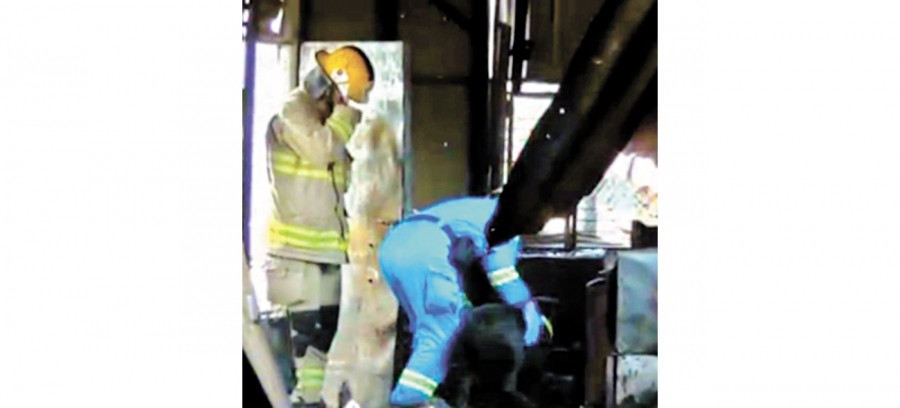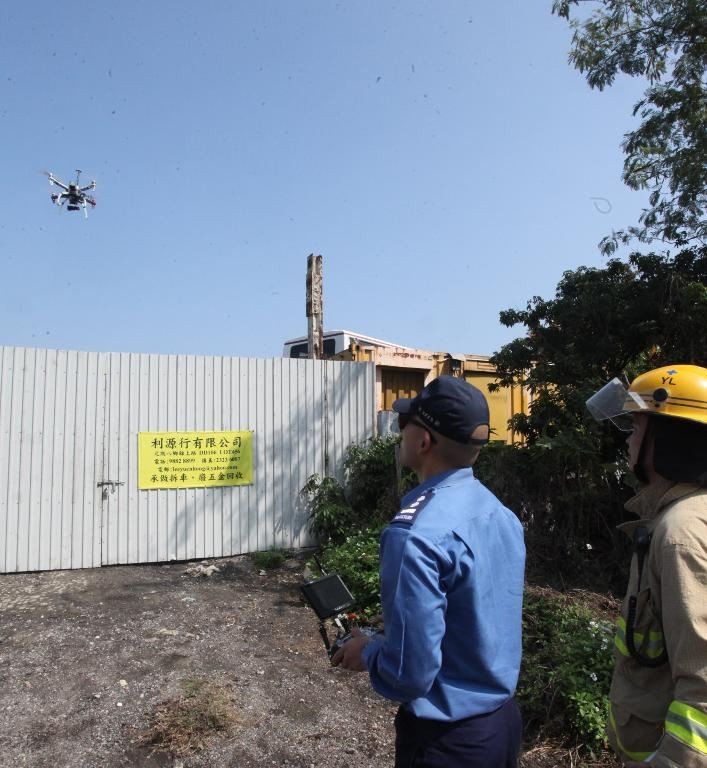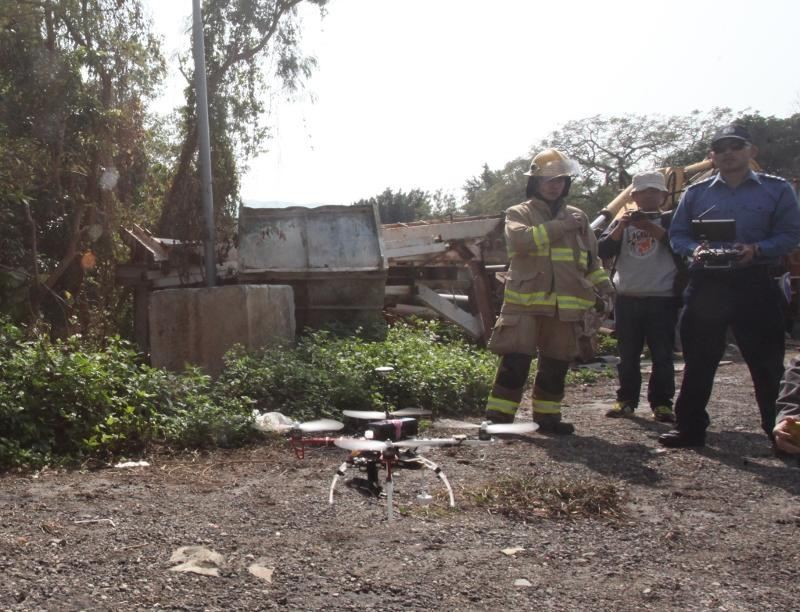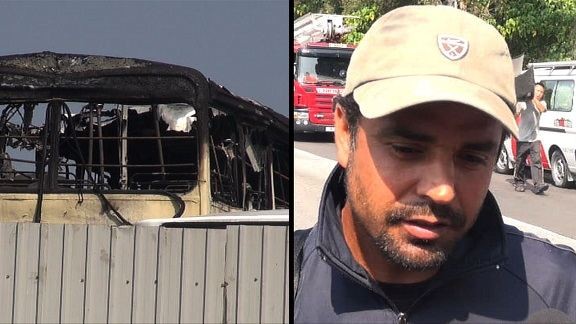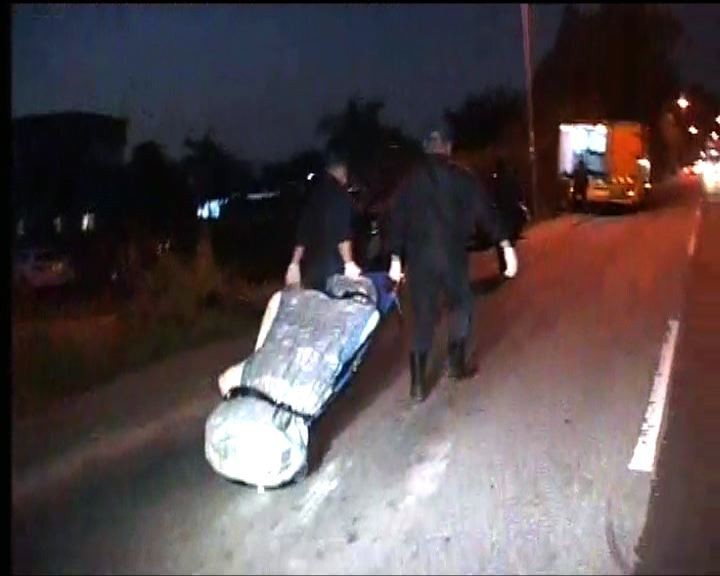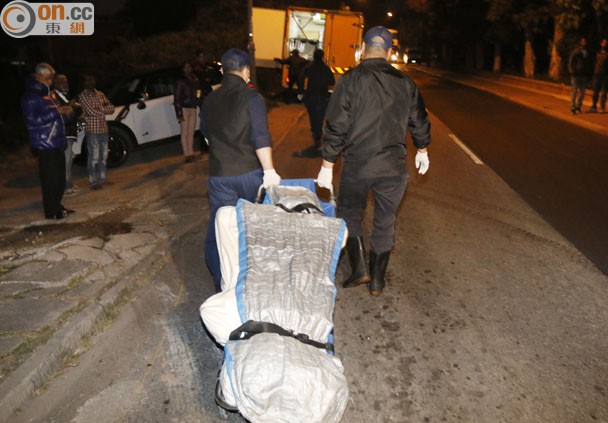Vision First promotes “BOR 2 claim”
Mar 11th, 2015 | Detention, Immigration, Legal, VF Opinion | Comment
Vision First reports that for almost a year some progressive legal professionals advised refugee clients to raise a “BOR 2 claim” together with their protection bids against torture, cruelty and persecution as prescribed under the Unified Screening Mechanism (USM).
“BOR” is short for the Hong Kong Bill of Rights Ordinance (Cap 383), wherein Article 2 describes certain fundamental human rights: “Every human being has the inherent right to life. This right shall be protected by law. No one shall be arbitrarily deprived of his life.”
HKBOR Article 2 (“BOR 2”) is a broad safeguard protecting the “right to life”. In brief, it defines that sentences of death may be imposed only for the most serious crimes and ought to be carried out pursuant to a final judgment rendered by a competent court. Anyone sentenced to death shall have the right to seek pardon or commutation of the sentence.
Put simply, every human being has an inherent right to life which can only be forfeited in the administration of justice by a legitimate court that includes an appeal process. Amnesty of the sentence of death may be granted in all cases. It follows that no person can be unjustly killed, summarily executed, or fall victim to extra-judicial killing without legal proceedings.
The Hong Kong Bill of Rights is binding on all public authorities. In particular, the Court of Final Appeal found in the “Ubamaka judgment” (FACV 15/2011) that it may be unlawful for the Director of Immigration to exercise his discretion in favour of deporting refugees who might face arbitrary deprived of life – a deeply unattractive prospect contrary to article 2 of the Hong Kong Bill of Rights.
In light of USM having rejected 99.9% of claims in 2014, Vision First advises refugees to consider including the BOR 2 claim in their letters to Immigration raising asylum claims. By reserving the right to be screened for a risk of arbitrary deprivation of life, claimants have additional grounds of non-refoulement protection other than the three prescribed grounds.
Vision First reports that currently the Immigration Department will in most cases stay claims (whether at screening or decision stage) once claimants reserve the right to be assessed also for BOR 2. To date Immigration has not indicated in writing what their stance is regarding this new claim. This has the practical result of putting on hold such asylum claims until the USM is expanded to include an assessment for the arbitrary deprivation of life.
Consequently, the 826 refugees who had USM claims rejected at appeal in 2014 could theoretically lodge BOR 2 claims with the Immigration Department. It is reported that from 11 March 2015 detainees in Castle Peak Bay Immigration Centre will be permitted to file BOR 2 claims.
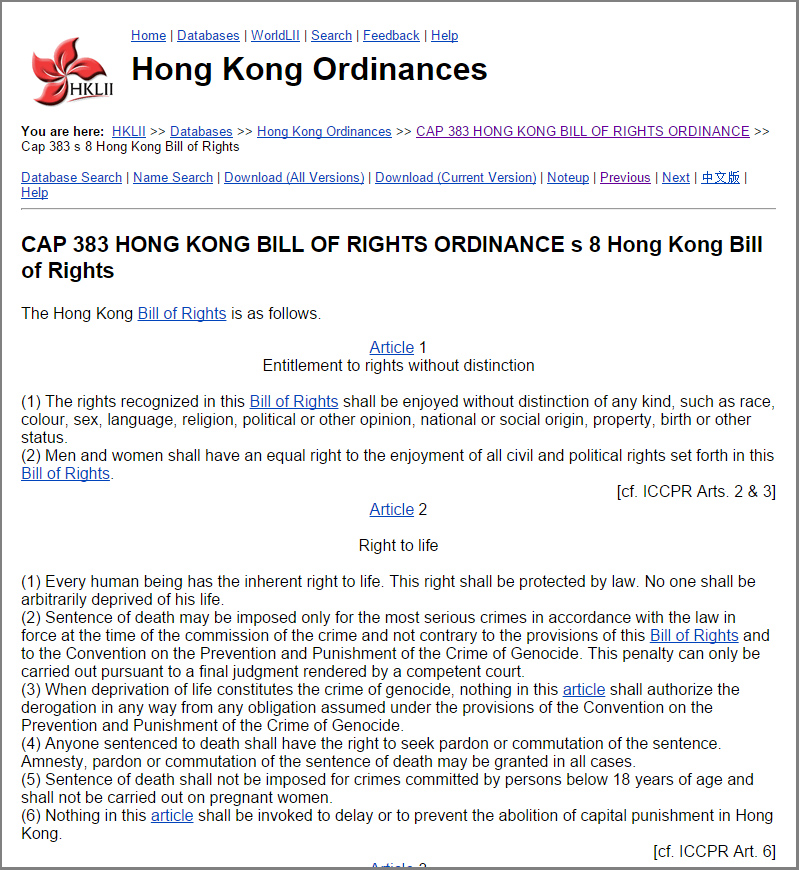
Should victims of unlawful detention settle for half damages?
Mar 9th, 2015 | Immigration, Legal, VF Opinion | Comment
Refugees have every right to seek sanctuary in Hong Kong where the domestic legal framework makes overtures of asylum protection to individuals fleeing torture, cruel inhuman degrading treatment and persecution. Whether claims are eventually substantiated or not by the Immigration Department is entirely a different matter.
Vision First advances the view that every claimant must be treated with utmost respect and every claim must be approached on the premise that it is genuine unless and until it is proven that it cannot be substantiated by the claimant with recourse to proper legal remedies, if necessary.
It is regrettable that immigration detention is utilized to discourage the lodging of claims, the pursuit of asylum bids, arguably to encourage the voluntary departure of those persons who are daunted by the punitive and hostile reception. Such techniques, if widespread and arbitrary, are insensitive to the experiences of those seeking asylum and are contrary to the spirit of asylum.
Protracted detention deprives claimants access to information and opportunity to purse their claims with the assistance of independent legal advisors. Prolonged detention pending determination of claims is contrary to the principle that a person can only be detained for a period that is reasonable in all the circumstances for the purpose of effecting removal or deportation.
On 17 March 2014, Vision First reported the landmark case of Mr. Ghulam Rbani, who won a Court of Final Appeal case (FACV 15/2013) against the Director of Immigration for damages for false imprisonment, claiming that he had been unlawfully detained at the Castle Peak Bay Immigration Centre (CIC). Simply put, the judgment opened the way for similar plaintiffs to be compensated with 1000 HK$ a day for the deprivation of liberty after lodging asylum claims.
Vision First is of the view that all claimants who were detained longer than 4 to 6 weeks in CIC should seek compensation not only as personal reparation for unlawful imprisonment, but particularly to discourage the arbitrary detention of those who trust Hong Kong government to protect them from torture, abuse and persecution.
In light of the above, the below letter by the Department of Justice raises questions. The plaintiff was allegedly unlawfully detained for 120 days and rightly demanded 120,000$ in compensation. The claimant laments, “When I was in CIC, [Immigration officers] gave me pressure every day to go back to my country. But I told them I am waiting for CIDTP case. I cannot go back because of danger.” The authorities are haggling over the price of injustice and offered half the amount.
Why should victims of unlawful detention settle for 50 percent?
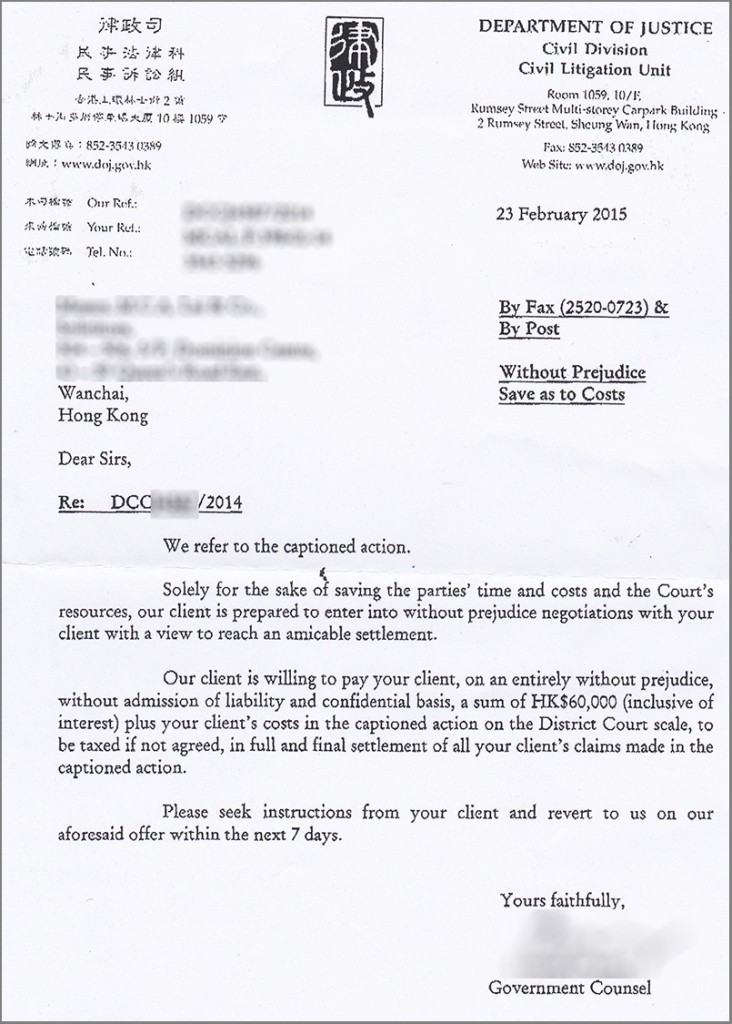
Fire Services launch inspection of refugee slums
Mar 5th, 2015 | Housing, VF Opinion, Welfare | Comment
On 4 March 2015 Vision First received five phone calls from several fire stations in the New Territory, referring to a list of refugee slums submitted for inspection. Fire Service Department (FSD) officers asked, “We are going to visit some of the slums shown on your website. May we ask the exact location? Could you pinpoint it on a Google map for reference?”
With a sense of urgency, the officers informed that they could not wait for a joint inspection because they were already on the way to Ping Che where the first 6 compounds on our list are located. They spoke about ‘deploying contingency plans’ and being tasks to conduct immediate investigations following various complaint letters and emails by Vision First.
Considering that we first communicated concerned about slum fire hazards in 2013, perhaps priorities changed in the wake of two events: 1) the death of a refugee in a blaze on 29 January 2015; and 2) the explosion of gas cylinders in a slum fire on 25 February 2015. These are incidents that supposedly would grab the attention of professionals tasks to protect people and property from fires.
Since time was of the essence, we suggested contacting the Refugee Union which has coordinators in every district and most rural villages, including Ping Che, from where the struggle against dangerous housing supported and subvented by ISS-HK started in May 2013. The FSD appreciated the suggestion and met a Refugee Union representative to inspect several slums yesterday.
For some utterly bizarre reason the Fire Service Department contacted an NGO (Vision First) and relied on the assistance of a society (Refugee Union), to locate and inspect refugee slums where public funds have been paid for years to purported landlords by a contracted agent (ISS-HK) of a government department (Social Welfare Department).
Why didn’t FSD ask SWD to pinpoint the slums on a Google map?
Could it be that the SWD remains clueless about the location of its refugee slums? And that would not be for lack of our offers to accompany them. It is increasingly perplexing that numerous law enforcement agents, Lands Department officers and Fire Services officers have inspected (many) slums, while the one department responsible for refugee housing prefers to remain in the dark.
Hong Kong needs a credible, transparent and expert-driven USM
Mar 3rd, 2015 | Immigration, Rejection, VF Opinion | Comment
The Unified Screening Mechanism (USM) will reach its first-year landmark on 3 March 2015 and the results achieved appear rather underwhelming and disheartening for refugees seeking the protection of Hong Kong Government. Immigration Department reports that as of 12 February 2015 five claims were substantiated, which Vision First understands to include 2 minors protected with their family.
The refugee community is concerned that in 23 years since the “UN Convention Against Torture” (CAT) was extended to Hong Kong in 1992, Immigration recognized only 28 cases as tallied by the South China Morning Post. Vision First sighted several Notices of Decision that included no less than 10 children counted as individual cases, thus further diminishing the impact of such unimpressive results.
Clearly statistics paint an incomplete picture, yet they are essential to evaluate the fairness of a screening process that accepted 5 claims and rejected 826 between March and December 2014 – a 0.60% acceptance rate that is deeply discouraging for 9618 individuals whose claims were outstanding at the end of last year. Some might suggest discouragement is the target here.
Granted that Immigration officers have at best one year experience with USM, we can only hope that high standards of fairness apply to determinations that are, “of momentous importance to the individual concerned. To him, life and limb are in jeopardy and his fundamental human right not to be subjected to torture is involved. Accordingly, high standards of fairness must be demanded in the making of such a determination.” (Court of Final Appeal “Prabakar” judgment, 2004)
“How do Immigration officers assess the situation in my country?” questioned an African refugee, “They don’t understand simple geography…. I have no confidence. Officers are not country experts. They print maps from the internet and learn from general websites that don’t explain the deep-rooted problems I faced. Shouldn’t I be worried about the quality of assessments?”
An Indian refugee said he had claims of police corruption in India rejected on the basis that India was a democracy and government websites called for a corruption-free administration in which offenders would be prosecuted to the fullest extent of the law. The claimant was faulted for having failed to report to the Police Anti-Corruption Bureau that village constables had drawn false charges against him allegedly upon the instigation of a rich and powerful land owner. Should he be deported?
There is a vast difference between what governments represent on official websites and law and order as implemented in the streets, where the enforcement action of anti-corruption bodies might not be taken seriously. That is the difference between theory and reality, the divergence between the rule of law and its application in the dark corners where human weakness prevails.
For that matter, police abuse in the cover of darkness isn’t unknown in developed countries.
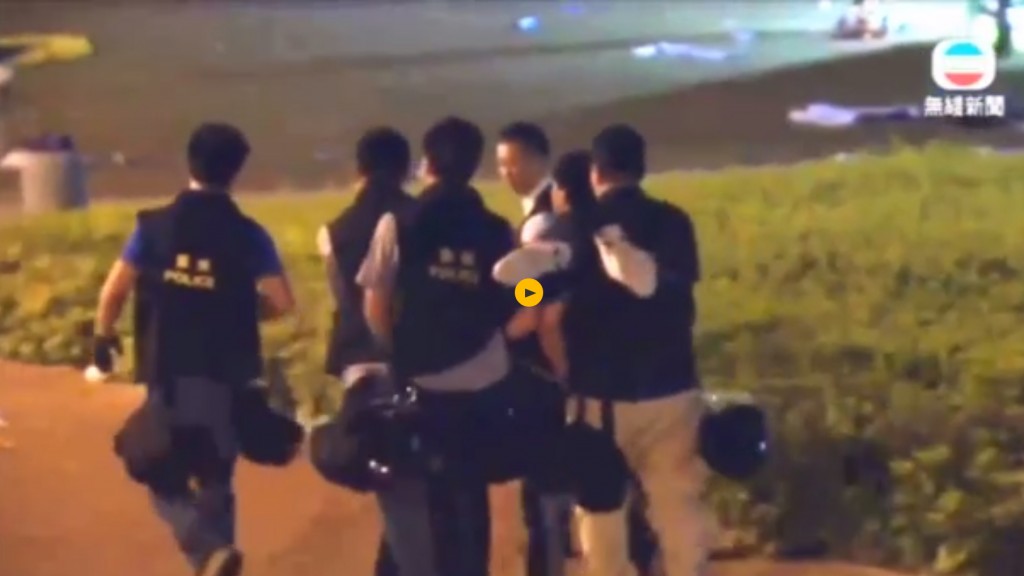
Seeking asylum – Day One
Feb 25th, 2015 | Immigration, Refugee Community, Rejection, VF Opinion | Comment
“I am so scared. I haven’t slept for three days. I am afraid Immigration will arrest me and put me in CIC [detention centre]. I don’t want to be deported because I can’t go back to my country,” sighed a 40 year Srilankan mother who secured informal refuge in Hong Kong through the domestic worker scheme – not an unusual practice for women escaping domestic, gender, ethnic or political violence in her country.
Vision First accompanied Ibrahim of the Refugee Union on an escort mission to Immigration Skyline Tower, in Kowloon Bay, where new asylum seekers are required to report to the General Investigation Section prior to lodging non-refoulement claims. The process is nerve-racking for persons who overstayed visas, or might have entered illegally, and must then surrender to immigration authorities to establish a protection status and void being arrested by police in the street.
“Without the Refugee Union I was too scared to surrender. I didn’t reported for two years to Immigration after I was terminated. I didn’t know what to do. I am afraid the police will arrest me,” remarked an undocumented Indonesian woman whose passport was retained by an agency for failing to settle exorbitant fees relating to her dismissal. “I better be a refugee in Hong Kong than go back. I owe loansharks 82 million Rupiah. They threatened to kill me if I don’t pay back with interest!”
“Before taking them to Kowloon Bay,” explained Ibrahim, “we register new cases and email Immigration with details and copies of documents. Only after receiving replies I bring them here to make sure new [claimants] are not arrested. Officers play tricks with those who come alone, like refusing to accept claims for some reason, or demanding documents they cannot produce. But if we go with them they will not arrest you.”
The lavish decor of this prestigious commercial building contrasts starkly with the grim tasks faced by dozens of hopefuls who commence their asylum ordeal at Skyline Tower with understandable trepidation. They start queuing up every morning at 8am on the ground floor, among officer workers accustomed to their presence, knowing that by 1030 an unofficial daily quota is closed and latecomers are gruffly waved away.
On 24 February we spoke with citizens from Gambia, Pakistan, Nepal, Tanzania, Srilanka, India, Bangladesh, Vietnam, Nigeria and Indonesia who were unwilling to leave Hong Kong and understood that seeking asylum was the only pathway to remain legally for as long as they could. “I need more time. I have problems back home that make it dangerous for me. I don’t want to live in Hong Kong, but for now I must stay until I figure it out!” explained an African who had lived three years in China.
The lifts of Skyline Tower keep releasing a mix of colourful characters on the 5th floor landing. Confused and befuddled overstayers emerged with eyes darting left and right searching for clues. They were visibly nervous and probably uninformed about an asylum adventure that equally ill-informed peers might have recommended. At this stage, a credible and independent information service could possibly guide hundreds towards wiser and more practical choices.
Immigration officers at the only counter are likely challenged by a ten-fold surge in asylum claims: from 491 cases in 2013, to 4634 between March and December 2014. The authorities might find it hard to explain the unprecedented surge despite policies designed to avoid ‘creating a magnet effect which could have serious implications on the sustainability of our current support systems and on our immigration control.’ The time might have come to completely overhaul the asylum process.
The cultural clash at the General Investigation counter is absolute: on one side of the window is a strained officer fielding questions in English and Chinese (resident friends seem to prefer the latter); while on the other side an anxious bunch presses for attention without the benefit of a number system. It becomes clear why the meek and less assertive are bounced back week after week.
Here is the gate that should bear the infernal sign: “Abandon hope all ye who enter here!” it is here that passports are sequestered, sometimes not be returned for years, and options reduced. For a few hours the hopeful pace anxiously the 5th floor lobby where neither a bench nor stool welcomes the weary. Then the system starts to divide: the fortunate are asked to photocopy documents and take a photo (average cost 70$), while the unfortunate are given a notice to return in a week or two.
There is a sense of relief among those who received a numbered ticket to queue up for the photo booth in room 504. They appreciate that they were not detained and in the afternoon they will obtain a Recognizance Form 8 issued by Hong Kong Immigration to overstayers seeking asylum. At this moment, the hopeful care less about the zero percent acceptance rate and more about the opportunity to remain in town for a few more months or years.
After Immigration officially releases them on recognizance, having established a breach of the original conditions of entry – thus criminalizing them as overstayers – asylum seekers may proceed to the 9th floor to lodge a USM claim. The process is simple: they submit a now standard form that circulated since January 2013 (it was first distributed by Vision First) and request a photocopy with a date stamp. A few weeks later Immigration will follow up with a request for written significations of claims and eventually offer an appointment to record fingerprints and photos.
Three times a week Ibrahim guides Refugee Union members to Kowloon Bay. He jokes about an officer complaining, “Don’t keep bringing people here, you make us busy”. Another officer once asked him for ID and wasn’t satisfied when he produced a RU membership card. Ibrahim was unfazed, “If you don’t like it, arrest me and call the police. They will confirm that they registered the Refugee Union to help all these people who are waiting here and wonder the streets without papers.”
For the avoidance of doubt, you are not welcome, refugees are told
Feb 23rd, 2015 | Immigration, VF Opinion | Comment
The rebels incinerated the home of a father of five, killed three family members, and brutally tortured and left him for dead. When news spread that he was still alive, arrest warrants circulated and, a dead man walking, the father fled alone to China with the assistance of a consular friend. His wife and children hid in the bush where his eldest son died. Almost two years after seeking asylum in Hong Kong, Immigration Department accepted his claim as substantiated.
Another victim of persecution, a parent of two children, sought the protection of Hong Kong Government in mid-2014 and was recognized a refugee less than a year later with the support of exhaustive documentary proof. Between 3 March 2014, when the Unified Screening Mechanism was launched and 12 February 2015, there were 5 substantiated cases out of 826 claims, maintaining Hong Kong’s effective zero percent acceptance rate (0.61%).
Setting aside vexing doubts about the other 821 claimants denied protection, Vision First is deeply concerned about the harsh and inhospitable treatment of successful claimants. They are in one breath notified a potentially life-changing decision and also informally told they are not welcomed to integrate and reconstruct a new life in Hong Kong.
Despite the promise of not deporting them into harm’s way, claimants are made acutely aware that the prohibition from working stays while they remain confined to the same inadequate welfare provisions they experienced as asylum seekers. Protection (from refoulement) does not come with the right to make a living in Hong Kong.
The Notices of Decisions clearly express the authorities’ position on reluctantly granting temporary asylum until alternative solutions are identified to rid the city of the annoyance of refugees. Claimants are informed that “in the circumstances, you will not be returned to [your country] for the time being”.
Then cases are “passed to the UNHCR for consideration should (you) be recognized as refugees under its mandate and … resettled to a third country as appropriate”. It seems that asylum policies in Hong Kong haven’t evolved from reliance on the United Nations to conveniently sweep away local problems with minimal expense and hassle.
The Notice of Decision warns that, “the making of removal order against you would not be precluded”, i.e. stopped, as “the Immigration Department may consider whether there is any special country other than (your homeland) to which you may return. If any such specific country is identified, you may be removed there.”
Further, the Notices of Decision issued by the Immigration Department states, “if you wish to leave Hong Kong at your own initiative, you may do so notwithstanding your substantiated non-refoulement claims. Please however be reminded that your non-refoulement claims will be treated as withdrawn and will not be re-opened if you leave Hong Kong.”
Finally, another paragraph in the disheartening notices warns, “For the avoidance of doubt, please be also reminded that a person will not be treated as ordinarily resident in Hong Kong … during any period in which he or she remains in Hong Kong only by virtue of a non-refoulement claim, including the period when his or hers non-refoulement claim is substantiated.”
The analysis of such protection documents reveals five warnings from Immigration: 1) we won’t send you back for now; 2) you are not welcome so get the UNHCR to resettle you elsewhere; 3) you are under a removal order and could be deported to another country; 4) you can’t work and won’t receive adequate welfare, so you can volunteer to leave; 5) if you are stuck here for years be aware that you are not treated as ordinarily resident and won’t be allowed citizenship.
As if the above were not depressing enough, the inauspicious Notices conclude with a final warning, “Please also note that your substantiated non-refoulement claim may be reviewed should there be any changes of circumstances and other reasons for considering revocation.”
Hong Kong Immigration’s notices granting international protection to distraught refugees conclude with the word: REVOCATION. It might reflect the spirit in which the Immigration Department reluctantly grants protection following a series of court judgments warning that, “the courts will on judicial review subject the [Immigration] determination to rigorous examination and anxious scrutiny to ensure that the required high standards of fairness have been met.”
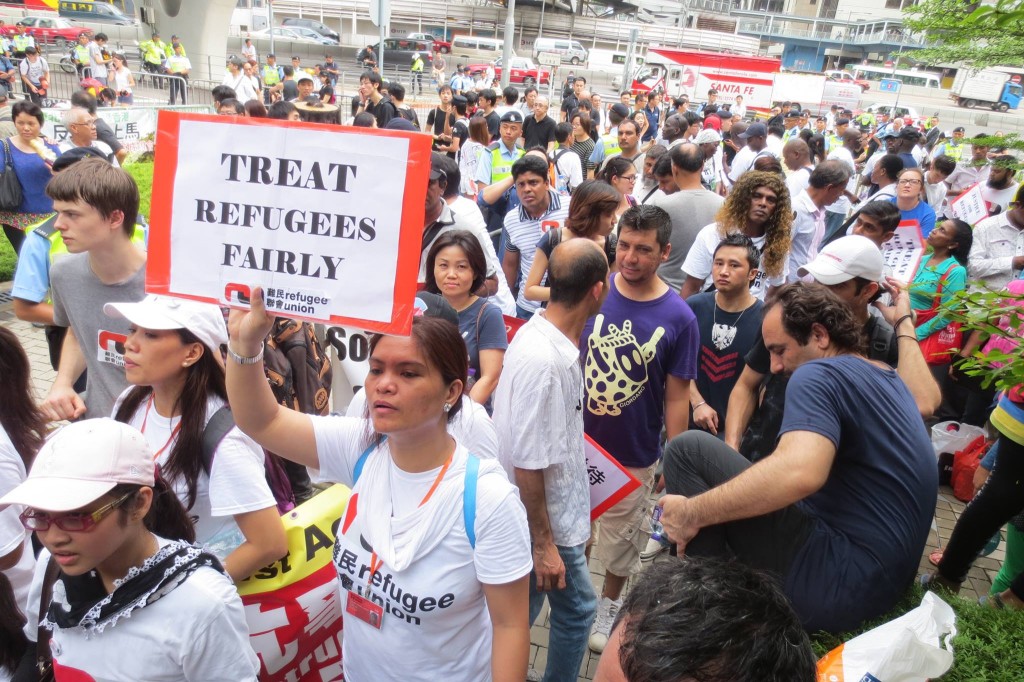
Hong Kong needs sustainable solutions in refugee policy
Feb 11th, 2015 | Housing, Immigration, VF Opinion, Welfare | Comment
Rose is a refugee mother living in the slums. She was distressed speaking to us, “My officer no give money to the landlord from 1 February. The officer said ‘Danger the place. You find another room. Rent money stopped paying already.’ Room outside very expensive. I must find another room, but I don’t have money. What can I do?”
Rose lamented, “If I leave and stay in ISS shelter where I put my property? I have double-bed, full kitchen and many bags of clothes for me, my husband and son. Landlord said we must pay cash for February rent or we cannot leave. [In her slum] landlord is asking 30 refugees to pay cash this month. He threaten everyone to pay before we leave.”
In September 2006 a South Asian refugee was settled in a pig farm by ISS-HK. His caseworker approved the arrangement with the landlord without inspecting the shack as Vision First reported in August 2013. A few months later ISS-HK relocated him to a guesthouse. Yesterday he was alarmed, “ISS said I must leave by Thursday. The cheapest room is 3000$ so where I find a room for 1500$. Where do I go? I am very afraid.”
Aziz is a vocal campaigner for better housing assistance for refugees evicted from the slums. He is unable to find a cheap enough room for himself and his wife. He reports, “ISS didn’t pay our rent in January and February. But ISS continue to pay for electricity and water. Why they don’t give more money to rent [better accommodation] than give it to the landlord? Officers from Lands Department tell to me this lot must all be demolished and turned into farmland.”
Richard is an African refugee settled by ISS-HK in a guesthouse 14 months ago when he was unable to secure a 1500$ room. He reports, “My caseworker said I must leave on Monday, but I refuse. Where I go? Do they want me to live in the street? ISS put me in a guesthouse when I was homeless a year ago. Today house prices are much higher and they still want me to find a room for the old price. What are they thinking? Refugees are not animals to kick outside …”
An SWD spokesperson responded to our bog “Housing crisis expanding to guesthouses” with this comment, “Thank you for your email of 6 February 2015 regarding the claimants living in guest houses arranged by ISS. We are looking into the matter and ISS has been alerted about it.” Something is not right. Isn’t the contractor implementing policies dictated by the government? Isn’t shifting responsibility to underlings cowardly incompetent to say the least?
Facts lead us to believe that the authorities caused the present housing crisis by a combination of (un)foreseen ramifications and unforgiving market forces. The time has come for the government to rethink their approach and the following constraints should be evaluated:
- refugees are not a temporary ‘problem’ to be fixed with residual humanitarian assistance;
- a work ban disempowers refugees from actively participating in problem solving;
- unrealistic rent assistance prices refugees out of basic rooms, exposes them to incarceration for working illegally while enriching unscrupulous citizens;
- after years of negligence the refugee slums are targeted for closure following Lucky’s death;
- lodging refugees in guesthouses for about 7000$ a month was ill-advised;
- the escalating housing crisis is a threat to social stability and public security that demands longterm, sustainable and reality-based solutions.
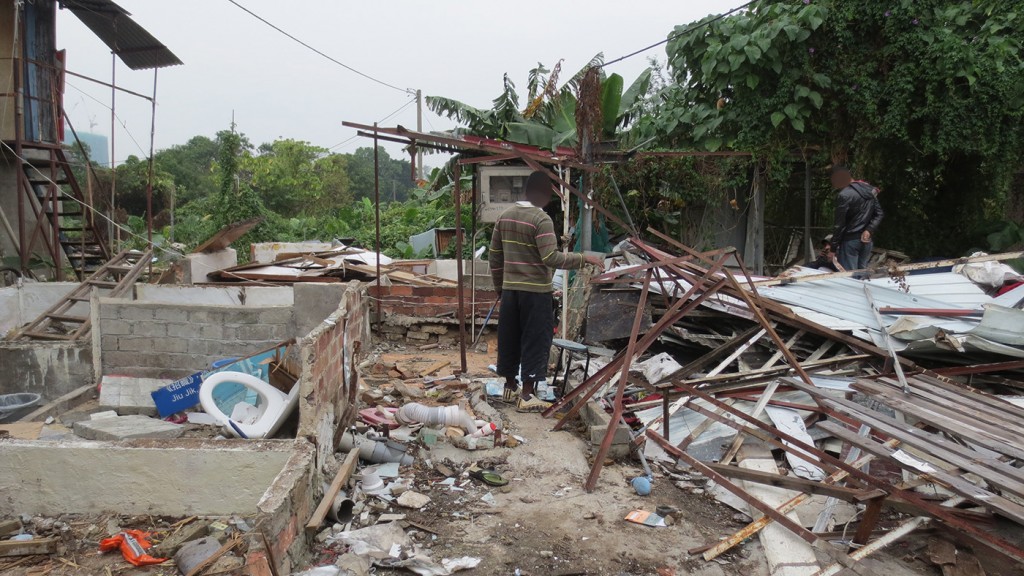
In memory of Lucky
Feb 4th, 2015 | VF Opinion | Comment
Tracing back along the path that led us to discover the entrapment of hundreds of refugees in makeshift, decadent and dangerous slums, some photos, that in hindsight fill us with emotions, testifies to a bitter end that might have been avoided.
On 23 August 2013 we first met Lucky, a quiet Sri Lankan refugee later risen to prominence in the news for his tragic end in the flames that destroyed the shack where he lived.
The photos below show the decorum, sought after by an individual who did not surrender to living as an animal in a converted pigsty. Basic furniture, collected from the waste of our consumerist society, cleaned and tidied for functional use hide the precariousness of a structure that an indecent toilet and metal walls cannot deny. Really it is hard to comprehend how such structures were officially approved for human living.
On our first encountered we were welcome by a man who had heard of the advocacy of Vision First and showed us our website as a way to prove that he was a keen supporter. Too many times his complaints had been ignored by others, taken as the rattle of a disbeliever in the moment of episcopal blessing – a mortal heresy.
Lucky was condemned to believing he was a reject for he was taken as a liar, a reality refugees endure, at times passively, by withdrawing in the comfort of the simple huts they call home, to which they grow attached, caring for its cleanness, refusing to be thrown in the rental market without having the means to compete for proper housing.
Today we contemplate these photos, before and after a tragedy that could have been avoided had there been a willingness to treat everyone with sympathy and dignity irrespective of immigration status. Regrettably it is too late for Hong Kong to offer Lucky the respect he was due. Rest in peace, brother!
Who is responsible for Lucky’s death?
Jan 30th, 2015 | Crime, Housing, Legal, VF Opinion, Welfare | Comment
Vision First exposed ‘The Slum On Two Storeys’ in August 2013 when we reported that an unscrupulous owner constructed a dangerous dormitory on two levels, where ISS-HK colluded to settle over 25 refugees. Evidence revealed that the Lands Department once authorized the construction of three pigsty and two chicken sheds on the lot, though licenses had been revoked.
A year and a half later only the names of some of the refugee tenants had changed as new-arrivals moved in. No government department seemed interested to address the problem of illegal structures that, in our view, constituted veritable ‘death traps’ owing to overcrowding, substandard construction, illegal electrical wiring, gas cooking in confined spaces and alarmingly a lack of firefighting equipment.
In a 28 January 2015 meeting, we brought to the attention of Lands Department officers that the slums generally constituted a fire hazard and it was only a matter of time before one would go up in flame, possibly with loss of human life. We remarked that the Fire Services Department had seen the photos of the slums and were keen to take coordinate action with SWD and Lands.
One day later we received an SMS from a Bangladeshi member, “Kam Sheung Road have refugee house burning. One man die just before”. The Refugee Union swung into action and photos spread on social media a few minutes later. A violent fire was raged out of control. Firemen from 18 trucks with two breathing apparatus team took 40 minutes to douse the inferno. Too late for Lucky!
He was known by the nickname “Lucky”, which didn’t protect him as he burnt to death in a tin shed. Lucky often complained about faulty electrical wire that gave shocks. It is reported that his ISS case worker visited his shack and looked into the problem a few days earlier. A friend explained that refugees often wire the slums with two-face system that can short-circuit and catch fire.
Vision First was familiar with Lucky’s hut and the others lining the path to the ‘Slum on Two Levels’. There was nothing legal there. Every part and material raised alarming concerns. In the slums there is imminent danger of collapse, flooding, gas explosion, lightning strikes and – most frightening – FIRE! Had it been nighttime with most residents at home sleeping, the death toll would have been high.
We can only hope that Lucky’s tragic death will not have been in vein. It was disappointing to witness the sudden media frenzy drawn by the excitement of a raging fire and a gruesome death. Why were the refugee slums not newsworthy yesterday? Why did it take a death to draw media and public interest? Lucky’s death was entirely avoidable if the authorities had taken action in August 2013.
























